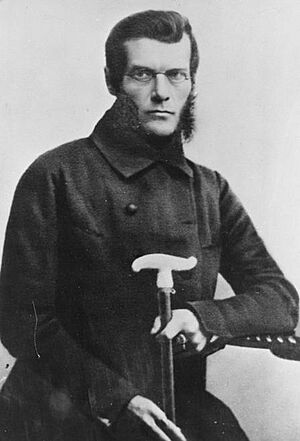Ivan Kireyevsky facts for kids
Ivan Vasilyevich Kireyevsky (born 1806, died 1856) was an important Russian thinker. He was a literary critic, which means he wrote about books and authors. He was also a philosopher, someone who thinks deeply about life and ideas. Ivan Kireyevsky helped start a group called the Slavophile movement with his friend Aleksey Khomyakov. This movement believed Russia had its own special path, different from Western Europe.
Contents
Early Life and Education
Ivan Kireyevsky and his brother Pyotr grew up in a wealthy and educated noble family. Their father strongly disliked French ideas that questioned religion. He even bought books by the French writer Voltaire just to burn them! Sadly, their father died when Ivan was only six years old. He caught typhus while helping wounded soldiers during the French invasion of Russia.
Ivan was then raised by his mother, Avdotya Yelagina, and his uncle, Vasily Zhukovsky. His mother later became famous for her lively discussions in Moscow. She didn't like Peter the Great because of how he treated his wife. These family views might have shaped Ivan's ideas about Russia's unique history.
Studying Philosophy and Literature
In 1821, Kireyevsky started studying at Moscow University. He became very interested in German philosophy, which was popular at the time. He joined a group called "wisdom-lovers" (Lyubomudry). This group was led by Dmitry Venevitinov and Vladimir Odoevsky.
Kireyevsky was especially impressed by the ideas of Schelling. Schelling saw the world as a living thing. This idea fit well with Kireyevsky's dislike for how European thought often broke things down into small pieces.
While Kireyevsky didn't write many famous stories or poems himself, he became known for his sharp reviews of other writers. In 1828, he wrote an important review of Pushkin's poetry. This review was one of the first deep looks at Pushkin's famous work, Eugene Onegin. Kireyevsky later exchanged letters with Pushkin. He also published some of Pushkin's works in his own short-lived magazine, "Yevropeyets" (The European).
Travels and New Ideas
After some personal disappointments, Kireyevsky traveled to Europe. There, he attended lectures by famous thinkers like Schelling, Schleiermacher, Hegel, and Michelet. During his travels, he started to see problems with Western society. He felt it was too focused on individualism, meaning each person thinking only of themselves.
He later compared this to the Russian idea of sobornost. This term means a spiritual community or togetherness. Kireyevsky believed Russian society had this sense of unity.
Back in Moscow by 1832, Kireyevsky gathered many important writers for his magazine "Yevropeyets". However, the journal was quickly banned after only two issues. Before it closed, Kireyevsky published a major article called The Nineteenth Century. This was his first big critique of Western philosophy and values.
A Break from Writing
The failure of "Yevropeyets" made Kireyevsky feel disappointed with Russian intellectuals. He got married and focused on his family life. For about twelve years, he didn't write much. Some critics thought this was because he was indecisive. His total written works are not very large, fitting into just a couple of volumes.
Later Life and Slavophile Ideas
In the early 1840s, Kireyevsky returned to the intellectual scene in Moscow. He joined his friend Khomyakov in debates against thinkers known as "Westernizers." These Westernizers believed Russia should follow Europe's path.
During the strict rule of Nicholas I, it was hard to publish freely. So, Kireyevsky and Khomyakov often discussed their ideas in private gatherings. They criticized what they saw as the "one-sided" and "superficial" way of thinking in the West.
Eastern Orthodoxy and Russian Identity
In his writings, Kireyevsky compared the ideas of Plato and early Christian thinkers (like Maximus the Confessor) with the more logical approach of Aristotle. He believed Aristotle's way of thinking had shaped the Western mind too much. Kireyevsky felt this led to a focus on simple logic rather than true wisdom. He saw Hegel's ideas as a modern example of this analytical approach, which he felt separated the mind from the soul and thoughts from religious feelings.
Kireyevsky wanted to bring back a sense of "wholeness" to people, which he found in the teachings of Eastern Orthodoxy. His religious wife introduced him to the wise elders (startsy) of the Optina Monastery. He visited this monastery often in his later years.
Kireyevsky greatly admired the spiritual wealth of medieval Russia. He believed that the monasteries of ancient Russia spread "a uniform and harmonious light of faith and learning." He felt that these churches and monasteries helped unite Russia into "a single living organism."
Ivan Kireyevsky passed away at the age of 50 during a cholera outbreak. His brother Pyotr died a few months later. They were both buried at the Optina Monastery, which was a special honor for people who were not monks.
See also
- List of 19th-century Russian Slavophiles
 | Kyle Baker |
 | Joseph Yoakum |
 | Laura Wheeler Waring |
 | Henry Ossawa Tanner |


